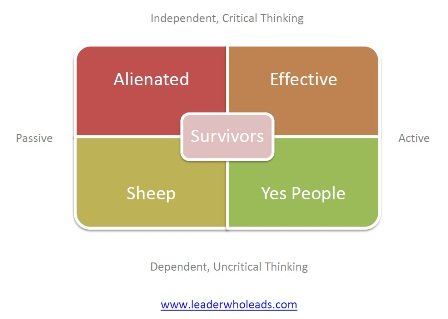Types of Followers
Just as there are different types of leaders, there are also different types of followers. Becoming familiar with attributes of the types will prove helpful in becoming a more effective leader.
Even if you hold a leadership position, you are also a follower. Therefore, that makes it doubly wise to understand theories about both leadership and followership.
Gaining a better understanding of those you lead can help you become a more effective leader AND follower!
"The proof of leadership is found in the followers." - John C. Maxwell
Followership
According to Merriam-Webster, followership is defined as "the capacity or willingness to follow a leader" or someone who holds a leadership position.
One of the most frustrating, and challenging, "opportunities" I encountered during my career was getting crystal clear on what my boss expects. When I have clarity on what is expected of me, I am more willing and able to be an effective follower.
Now, some bosses rightfully get the award for being bad bosses (more on that later).
Let's take a deeper diver into this topic of followership.
R. E. Kelley in his work “In Praise of Followers” identifies five (5) types:
- Sheep
- "Yes" People
- Alienated
- Survivor
- Effective
The types are measured along two dimensions:
Active vs. Passive and Independent vs. Dependent
A visual representation is shown below, along with a description of each.
Types of Followers
Most leaders love their "star players" - those who take initiative and do what needs to be done without having to be told or minimal prodding.
But a true test of leadership requires the willingness and capacity to develop direct reports who need more guidance and hands on supervision.
Alienated Followers
Kelley describes the alienated follower as one who is independent and thinks critically, but they are passive.
Because they are passive, they do not use their strengths to help the team achieve its goals. They have something of value to offer but choose not to do so. Their passivity distances them from the leader and their team members.
Of the five types, alienated followers tend to be the most disruptive. When they do not agree with a decision or course of direction, often they will not offer their input but readily offer passive resistance. Refusing to cooperate without telling why serves to magnify the conflict.
When dealing with this type of follower, these should prove helpful:
Sheep/Passive
Sheep are passive AND dependent. As such, they may not think critically, tend to do as they are told, and rarely put forth an opposing opinion.
They are leave the thinking to their leader.
These attributes serve neither them nor their fellow teammates.
Because they require constant supervision and prodding, this type of follower negatively affects team dynamics and performance.
As the leader, addressing this behavior head on in a positive way could turn things around. This may be the perfect time to give some performance feedback and support to develop their ability to make a valuable contribution to the team.

Yes People/Conformist
Yes People are active, but they are dependent AND do not think critically. Because they are conformist, they will agree with the leader without question and rarely challenge the status quo. Their major concern is avoiding conflict.
As such, these types of followers pose a danger to the leader and themselves due to their unwillingness and inability to put forth challenging viewpoints, which could produce a better outcome.
Sometimes "Yes, boss!" is not the best response.
Survivors
Survivors are chameleonic. They are adaptable, but not in a positive way.
Changing their opinions and behavior as the situation arises, this type of follower goes with the flow. To them, following the path of least resistance serves as protection and keeps them out of the line of fire.
Survivors are most interested in playing it safe rather than taking a risk. Their greatest fear? The fear of making a mistake. But unfounded fears, not supported by evidence, proves to be our foe not a friend.
Effective/Dynamic
Proactive, independent and able to think critically, effective followers are also respectful of the leader’s authority.
Effective followers are life-long learners. They practice self-leadership, take responsibility, are committed and seek feedback to continuously improve their performance.
Also known as “dynamic followers” they are very valuable to leaders and the team.
Because of their consistent and high-quality contributions, this type of follower is often a trusted advisor to leaders who lead. Dynamic followers have the potential to become dynamic leaders.
Of the five types of followers, this is the one I most strive to be. And hope you do too! Why? Because effective followers are usually those who are called to lead.
Increase Your Effectiveness
Learning how to manage time and set realistic goals will increase your chance of success in every area of your life. Following the advice in this course will help increase your productivity and help you achieve your dreams.
This is an affiliate link. Purchasing an eLearning course though this link will result in Leader Who Leads receiving a portion of the proceeds. Feel free to use this code to get an instant 25% DISCOUNT: SAVENOW25
Affiliate Link: Goal Setting & Getting Things Done
Are you looking to lead?
One of the most exciting times in my career was being promoted from an individual contributor role to a leadership position.
If that is on your radar, you will definitely want to check out my new book Called to Lead. Find out more HERE
As Seen on ABC & NBC
Want To Know More?
Wow, we have covered quite a bit of territory here. You may be wondering how to best use the information described above.
Ask yourself, "Of the five types of followers, which one do I identify with most?" Think about it.
Take time to assess yourself and consider getting a second opinion from a trusted confident. Also, consider asking for feedback from your leader, as well as from members of your team.
This just might help you become a member of the effective followers' club, even if you are a leader.
Remember, followership and leadership, both are needed for leaders who lead. For more on types of people who are followers, please check out Robert Kiyosaki's perspective on 4 Types of People.
Are you a female in the Corporate workplace?
If so, you will want to check out the top challenges women face in the workplace.
Improve Your Relationship with Your Boss
Are you looking to improve your relationship with your boss? If so, the Boss Relationship Worksheet will help you better understand and communicate more effectively with your immediate supervisor.
To download your copy, submit your information on the form below.
After completing the Boss Relationship Worksheet, you will find that the following will prove helpful in showing you how to cultivate a better working relationship with your boss:
 |
I published my first book and I am beyond excited.
Get your FREE copy of Called to Lead!
ORDER PRINT HERE
Leaders don't
create
followers.
Leaders
create
other
leaders.
- Tom Peters

















